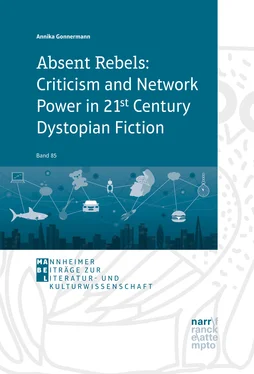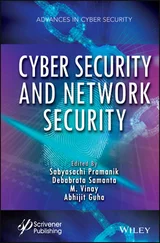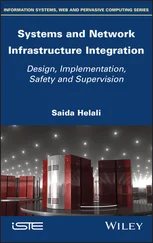Jaeggi maintains that in order to function properly, immanent criticism relies on the support of a theory-based reading of the criticised. In this case, immanent criticism “does not simply extract the ideal from reality [but] combines the idea that the standard of criticism resides in the thing itself with the claim to provide a context-transcending critique” ( Critique 191). The theoretical framework promising to be most illustrative in this context is the theory of power developed by David Grewal in his Network Power (2008), an investigation into the nature of power in the 21 stcentury. This study adds a new layer to the ancient discourse about the characteristics of power, which comes in many guises: the most typical form is what Michel Foucault refers to as “juridico-political model” (cf. Discipline and Punish , 1979). This notion of power as sovereignty dates back to the beginnings of political theory, often associated with Machiavelli, Locke, and Hobbes, who famously identified the Leviathan as the sole pole of power within their respective treatises of political power (cf. King and Kendall 217ff.). This top-down structure conceptualises power as radiating from one centre of (political) authority, and designates power in terms of its influence on others’ behaviour; by way of an example, Agent A imposes her will on Agent B. Foucault correctly asserts that “we have not ceased talking and thinking in terms of [the juridico-political model], [but] we actually live in relations of power that are quite different and that cannot be described properly in its terms” (Grewal 136). In her study How Fantasy Becomes Reality: Seeing Through Media Influence (2009), Karen E. Dill argues along the same lines:
When we think about manipulation, we are likely to think of strong-arm techniques: fascist dictators and terrorists manipulate and they do it with an iron fist. Think George Orwell’s Big Brother . Think of the motto of the Borg on TV’s Star Trek: The Next Generation : ‘Resistance is futile.’ Think Hitler, Stalin, Saddam Hussein, Osama Bin Laden, or the general view Americans had of Russia in the mid-twentieth century. The idea is that we’ll know when people want to manipulate us because they’ll publicly declare their intention or brag about how we’re powerless against their strength. (25)
Dill argues that we still think about manipulation and power “similar to how villains operate in the movies, on television and in video games” (ibid.): those exercising power do so according to Foucault’s juridico-political model in terms of oppression, violence, and threat to life and limb. Equally, King and Kendall also consider the Hobbesian notion of sovereign power as “the most fundamental form of power, a notion from which we have (for better or worse) yet to escape” (219). Sovereignty, then, is still the most ‘popular’ concept of power – not only in classical dystopian writing but also in the everyday usage of the term – that dominates our understanding of the concept, although contemporary forms of power have long since taken other forms.
David Grewal no longer defines power as influence but reconceptualises it as a peculiar mixture of individual agency and systemic coercion,3 captured within the term ‘network power.’ Grewal’s theory supports the understanding that power must not necessarily be conceived of in oppressive, coercive, and totalitarian terms but that the absence of voluntariness suffices as evidence of coercive structures. To formulate his argument, Grewal introduces the notion of standard , a “shared norm or practice” that facilitates cooperation among members of a network (21). He puts forward that individuals adopt a given standard whenever they hope for personal advantages in entering a network, providing examples ranging from linguistics to economics. Conceptualising English as a linguistic network, he argues convincingly that a desire to learn a new language, particularly the world’s number one trade and business language, is motivated by the wish to gain access to this community (cf. ibid. 74): “the French Canadians in Quebec are under pressure to learn English in order to benefit from national economic and political life, which occurs in predominantly Anglophone setting” (ibid. 71), although they might have preferred to enhance their competence in French or any other language. Whoever wishes to participate in the standard of English – a standard with “great network power” (ibid. 75) – must study English vocabulary and thus devote time and energy, which can no longer be invested in learning Hungarian, for instance. The same mechanisms are detectable in economic spheres, particularly money and the gold standard, which “was required for access to the [imperial] British market,” thus constituting a barrier to anyone wanting to engage in trade at the middle of the 19 thcentury (ibid. 97; cf. also Metcalf). In the first part of his analysis, Grewal has thus shown how self-reliant, rational individuals might perceive of the idea of switching to a certain standard without external coercion or threat to life and liberty. On the contrary, the switch to a dominant network seems to bring only advantages.
Broadly speaking, a standard is a neutral entity on display, an offer to autonomous agents who aim at maximising their chances in life. These standards can spread, all “propelled by people’s desire for access to members of a network” (Grewal 23). Network power is “the amount of real and potential influence exerted by that standard in relation to others ” (J. Ai-Etsuko Brown, emphasis in the original), meaning the appeal of a given standard to be adopted by initially free individuals in the hope of obtaining previously unattainable advantages in whatever aspect of life. Ultimately, as Grewal concludes, “the growth of a network is driven by the active choices of individuals rather than by their passive acceptance of something external to them” (26, emphasis in the original) – choices that are neither tainted by a false consciousness nor the product of coercion (cf. ibid. 128). Grewal makes it absolutely clear that “[i]t is our choices that lie behind network power, and nothing beyond or outside them” (26). While this first step in the development is often an autonomous decision by a rational individual, the following step conflates the notions of coercion and freedom considerably.
We can call a standard whose invitation has been taken up by everyone a universal standard . The power of a standard thus follows a peculiar trajectory on its way to universality: starting from reason [i.e. intrinsic or extrinsic motivation], force [i.e. avoidance of direct and indirect costs], or chance [i.e. accidental convergence], it grows in relation to the size of its network – even at an increasing rate – up to the point at which it replaces all competing standards. (ibid. 42, emphasis in the original)
Once a standard has become a ‘universal standard,’ “[c]hoices made in such conditions can become more and more constrained by the lack of acceptable alternatives until they prove formally free but substantially coerced” (ibid. 106). It becomes ever more costly for individuals to actively refuse a given standard, until it might actually be conceived as impossible, leaving them with no choice but to ‘choose’ the dominant standard no matter how disadvantageous: “[a]s a dominant network moves towards universality, the costs of deviation from the to-be-universal standard increase until not being a member of the universal network is equivalent to social exclusion in the domain governed by that standard” (ibid. 107). Fateful moments are times when events come together in such a way that an individual stands, as it were, at a crossroads in his existence; or where a person learns of information with fateful consequences. Fateful moments include the decision to get married, the wedding ceremony itself – and, later, perhaps the decision to separate and the actual parting. […] There are, of course, fateful moments in the history of collectivities as well as in the lives of individuals. They are phases at which things are wrenched out of joint, where a given state of affairs is suddenly altered by a few key events. (113)
Читать дальше












